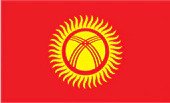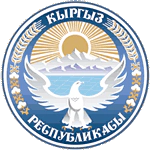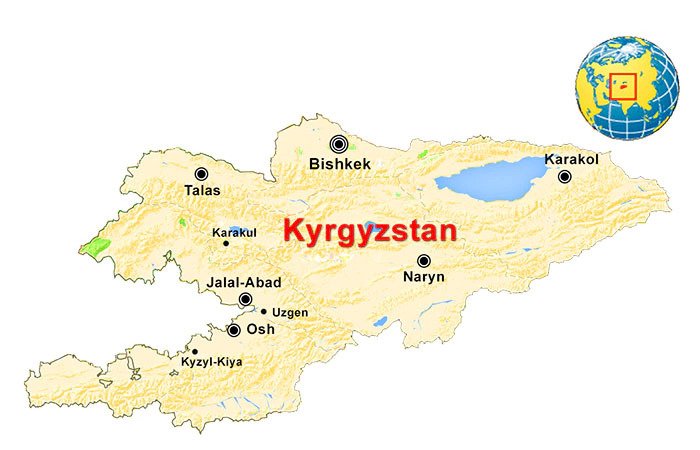Kyrgyzstan
Official name: Kyrgyz Republic.
Area: 199,951 km2.
Population: 5,895,100 (2015 est.)
Capital: Bishkek
Official language: Kyrgyz (national), Russian (official).
Government: Unitary presidential republic.
President: Sooronbai Jeenbekov
Religion: Islam, Orthodoxy.
Currency: Som (KGS)
Time zone: KGT (UTC+5 to +6)
Movement from the right: right
Banking days: Monday – Friday.
Electrical Power: 220 VAC, 50 A (standard 2-pin socket)
Telephone code: +996
Internet TLD: .kg

Flag

Emblema

Map
Kyrgyzstan Officially, the Kyrgyz Republic is one of six independent Turkic states in the world (along with Turkey, Azerbaijan, Turkmenistan, Uzbekistan and Kazakhstan). Located in Central Asia, landlocked and mountainous, Kyrgyzstan is bordered by Kazakhstan to the north, Uzbekistan to the west, Tajikistan to the southwest, and China to the east. The capital and largest city is Bishkek. Kyrgyzstan is officially a democratic parliamentary republic. The national language, Kyrgyz, is also closely related to other Turkic languages, with which it has strong cultural and historical ties. In addition, Kyrgyzstan is a member of the Commonwealth of Independent States, the Eurasian Economic Community, the Non-Aligned Movement and the Organization of Islamic Cooperation. Regions and districts Kyrgyzstan is divided into seven regions, which are governed by appointed governors. The capital Bishkek and the second largest city Osh are administratively independent cities with a status equal to the region.
Geography
Kyrgyzstan is a landlocked country in Central Asia, bordering Kazakhstan, China, Tajikistan and Uzbekistan. It is located between 39° and 44° north latitude and 69° and 81° east longitude. It is further from the ocean than any other country in the world, although it does not have the furthest point from any ocean. This place is located in the Xinjiang region of northwest China. The mountainous region of the Tien Shan occupies more than 80% of the country's territory (as a result, Kyrgyzstan is sometimes called the "Switzerland of Central Asia"), with the rest being
Climate
The climate varies depending on the region. The southwest Fergana Valley is subtropical and very hot in summer, with temperatures reaching 40 °C (104 °F). The northern foothills have a temperate climate, and in the Tien Shan the climate varies from dry continental to polar, depending on the altitude. In the coldest areas, temperatures remain below freezing for about 40 days during the winter, and even some desert areas experience constant snowfall during this period.
Demography
The population of Kyrgyzstan is estimated at more than 5.2 million people. Of these, 34.4% are under 15 years of age and 6.2% are over 65 years of age. The country is rural: only about a third of the population lives in cities. The average population density is 25 people per km². The country's largest ethnic group is the Kyrgyz, a Turkic people, who make up 69% of the population (2007 estimate). Other ethnic groups include Russians (9.0%), concentrated in the north, and Uzbeks (14.5%), living in the south. Small but noticeable minorities include Tatars (1.9%), Uighurs (1.1%), Tajiks (1.1%), Kazakhs (0.7%), Ukrainians (0.5%) and other smaller ethnic groups minorities (1.7%). More than 80 different ethnic groups live in Kyrgyzstan.
Religion
Islam is the dominant religion of Kyrgyzstan: 80% of the population professes Muslims, 17% professes Orthodoxy and 3% other religions.
Holidays
January 1 – New Year
January 7 - Russian Orthodox Christmas.
February 23 - Defender of the Fatherland Day.
March 8 - Women's Day
March 21 – Nooruz, Muslim spring holiday.
March 24 is National Revolution Day.
May 1 - Labor Day
May 5 - Constitution Day
May 8 – Memorial Day
May 9 – Victory Day (end of the Great Patriotic War).
August 31 - Independence Day
November 7 is the Day of the Great October Socialist Revolution.
